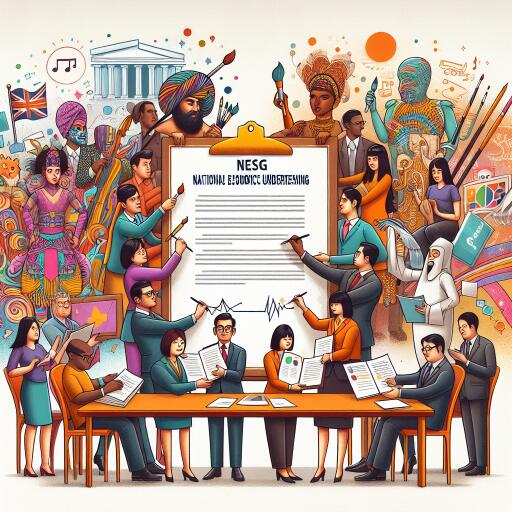Partnership to Propel Nigeria’s Creative Industry towards Economic Triumph
In an historic move aimed at propelling the Nigerian creative sector to new heights, the Ministry of Art, Culture, and the Creative Economy has joined forces with the Nigerian Economic Summit Group (NESG) through a pivotal Memorandum of Understanding (MoU). The collaboration, formalized in Abuja, seeks to lay down a financing framework to catalyze growth within this vibrant industry.
This transformative partnership aspires not only to invigorate the sector but to unlock its colossal potential, eyeing an ambitious contribution to Nigeria’s Gross Domestic Product (GDP) of $100 billion by 2030, along with the creation of two million jobs by 2027.
A New Dawn for Nigeria’s Creative Industry
Hannatu Musa Musawa, the Minister overseeing the initiative, heralded the MoU as a critical step towards unleashing the full potential of Nigeria’s creative talents, framing the industry as a future economic powerhouse and a significant revenue stream for the country.
“Our union with NESG stands on a concrete foundation of mutual objectives aimed at establishing a formidable governance framework for the art, culture, and creative domains,” Musawa explained.
Musawa highlighted the development of a draft Cultural Policy intended to foster cultural integration, preserve national values, and protect Nigeria’s rich cultural tapestry. The policy aims to set clear objectives and strategies for cultural development, language preservation, historiography, and the promotion of diversity and inclusivity.
The envisioned policy, resulting from the ministry’s collaboration with NESG, outlines strategic direction, key objectives, and regulatory mechanisms to ensure growth, innovation, and sustainability in the sector. With legislative support, it seeks to establish a Central Authority for Art, Culture, and the Creative Economy and a dedicated fund to bolster the industry’s development.
Unlocking Creative Potential through Public-Private Partnership
Dr. Tayo Aduloju, NESG’s lead and Chief Executive, marked the agreement as a landmark event in the Nigerian creative sector’s history, emphasizing the role of the Creative Economy Working Group in fostering dialogue and collaboration amongst stakeholders.
“The Working Group will ensure effective stakeholder collaboration through industrial associations, capacity-building initiatives, and policy enhancement efforts, aiming not only at nurturing creativity but at driving entrepreneurship and employability among Nigeria’s youth,” Dr. Aduloju stated.
Mr. James Sule, the Permanent Secretary of the ministry, lauded the MoU as a significant step forward, underscoring its potential to drive economic growth, showcase local talent, and attract investment both from within Nigeria and beyond its borders.
“This partnership envisages NESG’s involvement in reviewing and amending existing policies, regulations, and legislative frameworks to better serve the cultural and creative economy,” Sule added. He detailed how the partnership would facilitate the exchange of expertise and research to foster informed decision-making and enhance stakeholder engagement through various platforms.
With this groundbreaking partnership, the stage is set for a transformative leap in Nigeria’s creative industry, promising a prosperous future for the nation’s creative talents, its economy, and, importantly, its youth.









